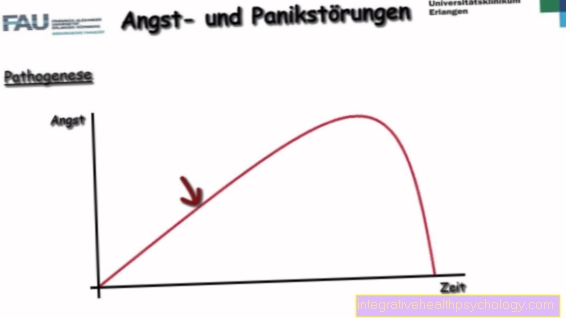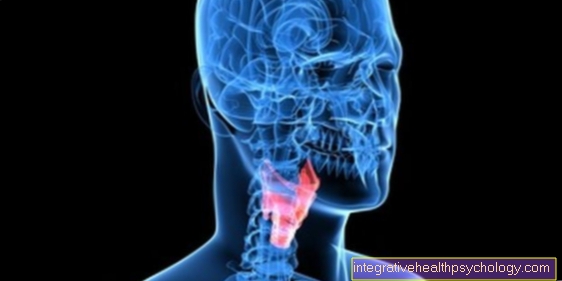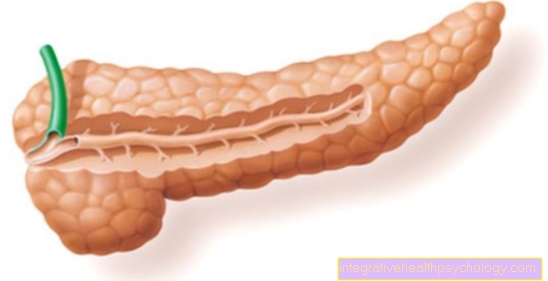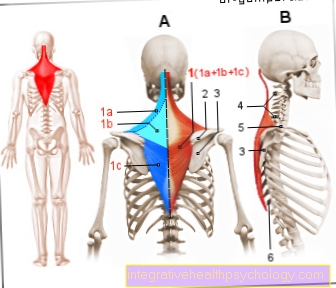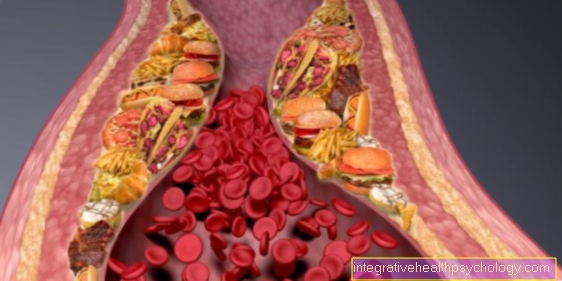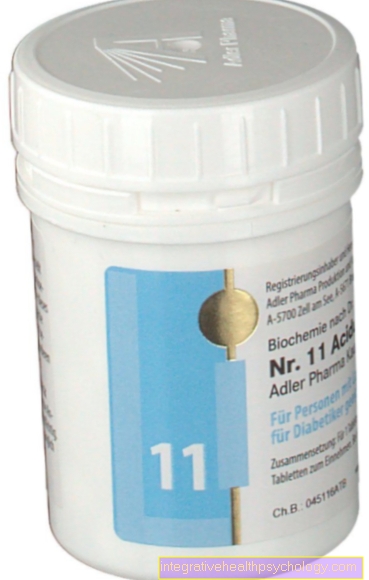T3 hormone
definition
Triiodothyronine, also called T3, is one of the two most important hormones made in the thyroid. T3 is the thyroid's most effective hormone. T3 exceeds the thyroid hormone tetraiodothyronine, the so-called T4, by three to five times in its biological activity. The two iodine-containing thyroid hormones are created from the protein thyroglobulin. T3 consists of a thyroglobulin with three iodine groups, while T4 consists of a thyroglobulin with four iodine groups.

introduction
The thyroid gland produces the hormones T3 and T4 when it is stimulated to do so by the hormone TSH from the brain, more precisely from the pituitary gland.
The iodine-containing thyroid hormones increase the energy metabolism of the cells and promote the release of the hormones insulin and growth hormone. They also have an impact on the cardiovascular system. The T3 hormone is> 99% bound to plasma proteins in the blood plasma, especially to the thyroxine-binding globulin. Only <1% of the amount of hormones is free in the blood. T3 has a plasma half-life of around 24 hours, which means that it is deactivated by the body relatively quickly.
Values / normal values of the T3 hormone
Most of the T3 in the blood is bound to proteins, while only less than 1% is in free form as free T3 (fT3). The concentration of the hormone in the blood is subject to daily fluctuations. At night there is an increase and during the day there is a decrease in the hormone in the blood. Since only the free hormone fT3 is effective and the bound T3 serves as a hormone store, in practice it is mainly the free (not bound to protein) T3, the fT3, that is measured. The concentration of the hormone in the blood is given in nanograms per deciliter and for free T3 in picograms per milliliter.
The normal range for T3 is in a range of 67 - 163 ng / dl. The normal parameters for fT3 are 2.6-5.1 pg / ml. If you have an underactive thyroid (see also: Values of an underactive thyroid) fT3 is below 2.6 pg / ml, while it is greater than 5.1 pg / ml for an overactive thyroid. It is important that the normal values can differ in different laboratories, so the reference values given there should always be considered.
Why is my T3 value too high?
If you have an overactive thyroid (Hyperthyroidism) the thyroid makes too many hormones. There are various causes of an overactive thyroid and a correspondingly high T3 value. In about 95% of cases, the autoimmune disease Graves' disease or thyroid autonomy are the cause of the hyperfunction.
In Graves' disease, the immune system forms antibodies against the thyroid, which take the place of the TSH hormone on the outside of the cells. The thyroid cells mistakenly think the antibodies are TSH and are stimulated to produce hormones. This is why there is far too much T3 and T4 in the blood in Graves' disease.
If thyroid autonomy is the cause of the overactive function, there are areas in the thyroid gland itself, for example nodes, that produce hormones in an uncontrolled manner. Often iodine deficiency is the cause and the body tries to compensate for the deficiency through growth. Other causes of hyperthyroidism include inflammation of the thyroid gland, tumors, or drugs.
Why is my T3 value too low?
If the thyroid is underactive (Hypothyroidism) the thyroid gland produces fewer hormones than the body needs. The thyroid hormones T3 and T4 are too low in the blood. The causes of hypofunction can be problems in the thyroid gland or in hormone-producing structures in the brain, the so-called hypothalamus or the pituitary gland (Pituitary gland). A congenital underactive thyroid, which occurs in around 1 in 4,000 children, is rare. A low-iodine diet is also a rare cause of low T3 levels. A possible cause of hypothyroidism is chronic thyroid inflammation, Hashimoto's thyroiditis. In this autoimmune disease, antibodies are formed against the organ that partially destroy the tissue. Over time, the thyroid gland in Hashimoto's thyroeiditis develops hypothyroidism and T3 decreases.
Pituitary or hypothalamic disorders due to a tumor can also lead to an underactive thyroid.
How does T3 change during pregnancy?
The thyroid hormones have an impact on fertility, the course of pregnancy and child development. The normal values for the hormones change during the pregnancy phases, i.e. differently from trimester to trimester. In addition, up to 15% of all pregnancies have changes in thyroid function, i.e. either overactive or underactive. These disorders can lead to preventable complications of pregnancy and child development. According to a recent study, the reference values for free T3 in the first trimester of pregnancy are 2.5-3.9 pg / ml, in the second trimester 2.1-3.6 pg / ml and in the third trimester 2.0- 3.3 pg / ml (Study: Lazarus J et al., 2014, Eur Thyroid J Guidelines 3: 76-94).
You might also be interested in: Thyroid levels in pregnancy
T3 hormone level and desire for children
A thyroid disorder can be the cause of an unfulfilled desire to have children. Even very discreet or “sleeping” hypothyroidism can lead to infertility. Both an overactive and an underactive thyroid can negatively affect conception and lead to the absence of the desired child. The reason for this is that the thyroid hormones control all important processes in the body. They affect fertility and reproduction.
Thyroid hormones and sex hormones such as estrogen are related and influence each other. This means that an imbalance in thyroid hormones affects egg maturation and the cycle. Affected women are less likely to become pregnant than women with healthy thyroid gland. A thyroid check-up is indicated if the family has known thyroid problems, irregular periods, or if pregnancy does not occur after 6 months. If there is an underfunction, this can be treated with medication and enable the desired pregnancy.
T3 hormone as a drug
T3 is available as a drug to replace the hormone deficiency in the case of an underactive thyroid. Thyroid hormones are given in the form of levothyroxine and most people have to take this drug for life. With the correct dosage, there are seldom side effects.
If the amount of levothyroxine is taken too much or increased too quickly, heart problems or other signs of an overactive thyroid may occur, such as sweating, tremors, diarrhea. Hypersensitivity reactions such as cardiac arrhythmias, angina pectoris, insomnia, food cravings, hair loss or high blood pressure rarely occur. It is important that when taking thyroxine, drug interactions may occur (e.g. Salicylates, furosemide, sertraline, barbiturates, amiodarone), which is why the intake of the drug must be checked by a doctor.
The aim of treatment with levothyroxine is to normalize the pathologically reduced concentration of thyroid hormones in the blood. This can alleviate the symptoms of hypothyroidism such as unwanted weight gain, sluggishness, concentration and memory disorders, constipation, brittle hair and nails.
Read more about this topic under: L-thyroxine
T3 hormone for weight loss
If you have an underactive thyroid, you often gain weight. The reason for this is that the body's basal metabolic rate changes when there is less T3. The basal metabolic rate is reduced and you gain weight more quickly, although you don't eat more or eat less than before hypothyroidism, for example. Because of these and other symptoms of hypofunction, therapy with the drug levothyroxine is usually scheduled. It may take a few months to set the correct dose. If the thyroid values are normalized, the symptoms usually improve. It is clearly easier to lose weight when the levels are normal.
However, under no circumstances should thyroid hormones be misused for weight loss if there is no medically diagnosed hypofunction of the thyroid gland. Incorrect doses of thyroid medication can cause serious and life-threatening side effects, especially when combined with other weight loss medications.
If there is no diagnosed hypothyroidism, but you still want to lose weight, Dr-Gumpert Theam recommends our new topic: How do I get thin?
T4 vs T3 - what's the difference?
The thyroid gland produces 90% thyroxine (T4) and 10% triiodothyronine (T3). The thyroid gland produces more T4 than T3, but T3 is much more active. The majority of T4 is therefore also converted to the active hormone T3 in the liver. Both hormones consist of the protein thyroglobulin. This is processed and iodized in the thyroid cells, which means that iodine residues are attached to certain processed structures of thyroglobulin. With the hormone T3 (Triiodothyronine) there are three iodine groups, at T4 (Tetraiodothyronine) there are four iodine groups.
The hormones have a variety of effects. T3 is significantly more effective than T4, especially at the receptors of the cardiovascular system. In contrast, T4 acts more strongly in the brain and the pituitary gland (Pituitary gland). The thyroid hormones increase the cellular energy metabolism and promote the release of the hormones growth hormone and insulin. They regulate fat and sugar metabolism and have an impact on bone growth, connective tissue metabolism and physical and mental development (especially in fetuses). T3 and T4 are essential for the growth and maturation of the organism.
Read more about this: T3 - T4 hormones
Further general information on the subject of "T3 hormone"
- Thyroid hormones
- T3 - T4 hormones
Further general information may also be of interest to you:
- Calcitonin
- Thyroxine
- Hyperthyroidism
- Hypothyroidism




